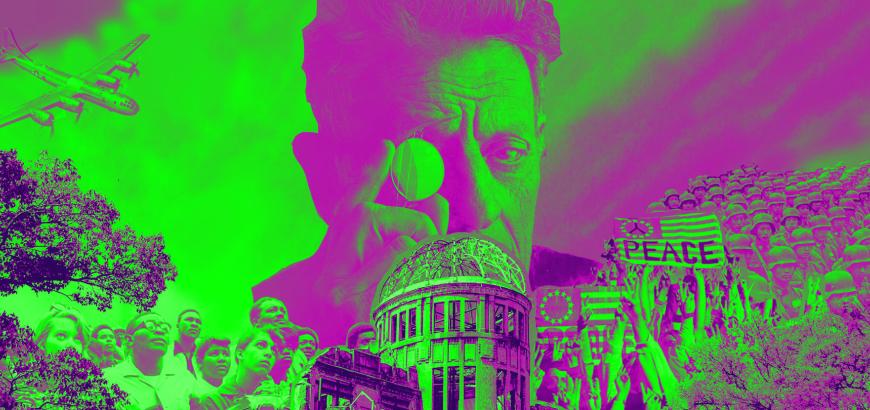UW Vocal Theatre Works presents the Seattle premiere of Hydrogen Jukebox, composed by Philip Glass, with a libretto by Beat poet Allen Ginsberg. A modern classic, this work of music-theatre challenges artists and audiences alike to examine both the potential and failings of the American Experience and to explore ever-relevant themes of war and peace, social equity, and environmental and economic sustainability. With musical preparation and conducting by visiting artist Dean Williamson and stage direction by Deanne Meek.
Join Us After the Show
Following our presentation of Philip Glass's Hydrogen Jukebox, join us for light refreshments at our post-show reception where you will have the opportunity to meet the creative team, our talented student musicians, and our special panel discussion guests. Please RSVP below so we can plan for the proper number of guests each night.
Learn More
Program Details
Led by Visiting Artist Deanne Meek and faculty artist-in-residence Cyndia Sieden, UW Vocal Theatre Works explores the American Experience through the Seattle premiere of “Hydrogen Jukebox”, composed by Philip Glass with text from the poetry of Allen Ginsberg. Premiered in 1990, this work of music-theatre examines Beat Generation themes of anti-militarism, modern industrial alienation, sexual liberation and environmental degradation, challenging audiences to a contemporary interpretation of Ginsberg’s iconic writing. Under musical direction by Dean Williamson and stage direction by Deanne Meek, Vocal Theatre Works presents two student casts over two nights, with orchestral collaboration by UW faculty artists and students of the Percussion and Modern Music Ensembles. An exploration of themes within the work continues in post-performance discussions featuring performers and guests.
VIEW AUDIENCE GUIDE
Casts:
Friday, April 26
Soprano 1 Sarah Fantappié
Soprano 2 Tasha Hayward
Mezzo-Soprano Eun Ju Vivianna Oh
Tenor Will Schlott
Baritone 1 Darrell J. Jordan
Baritone 2/Bass Jacob Caspe
Narrator Trevor Ainge
Saturday, April 27
Soprano 1 Lauren Kulesa
Soprano 2 Erika Meyer
Mezzo-Soprano Eun Ju Vivianna Oh
Tenor John O’Kane
Baritone 1 Christopher Benfield
Baritone 2/Bass Jacob Caspe
Narrator Trevor Ainge
Orchestra
Featuring Members of the UW Faculty, Modern Music Ensemble, Jazz and Percussion Studies
Saxophone:
Greg Sinibaldi
Steve Treseler
Flute:
Audrey Cullen
Piano:
Hariet Wong
Tristan Greeno
Percussion:
Aiden Gold
Lynn Park
Mason Lynass
Sophie Schmidt
Conductor and Musical Direction: Dean Williamson
Stage Direction: Deanne Meek
Choreography: Tamin Totzke
Projection Design: Grant Bowen
Sets and Costumes: Deanne Meek
Lighting: Doug Meier
Technical Assistance: Tom Burke, Doug Niemela
Artist Bios

Dean Williamson is widely known throughout the United States for his perceptive and commanding conducting. His ambitious and versatile career in standard and contemporary repertoire earns the conductor worldwide acclaim. The Washington Post says “a brilliantly directed, beautifully sung and endlessly funny Barber of Seville…the orchestra, which played the sparkling overture and the vivid storm music with grace and color under the expert baton of Dean Williamson.” The Seattle Times says “Williamson keeps a sure, steady hand on the singers and the orchestra…realizing the shimmering and otherworldly textures of the score.” This season Maestro Williamson conducts for Nashville Opera, where he’s entering his 3rd season as Music Director, with productions of Tosca, Maria de Buenos Aires, and Susannah. Additionally, he conducts Madama Butterfly with Opera Idaho. Future seasons see Williamson in returns to Arizona Opera.
Last season, Mo. Williamson conducted Nashville Opera’s productions of Don Giovanni, Glory Denied, and Three Way, which he also conducted at Brooklyn Academy of Music and which was recently recorded with the original cast conducted by Williamson on the American Modern Recordings label; La Cenerentola with Arizona Opera; and Tosca with Intermountain Opera Bozeman.
Recent engagements include Hydrogen Jukebox, Così fan tutte, and Die Fledermaus with Nashville Opera; Don Pasquale for Intermountain Opera Bozeman; and Faure’s Penelope for Philharmonia Northwest. For his New York City and Lincoln Center début, Williamson also lead New York City Opera orchestra in a production of Florencia en el Amazonas to which the critics at The New York Time raved “Dean Williamson drew colorful, shimmering playing from the City Opera orchestra.” Additionally, he was honored with a nomination for the 2015 Emmy Awards for the televised broadcast of the production of Le comte Ory that he conducted for Des Moines Metro Opera.
Additional highlights from recent seasons include returns to Seattle Opera for Il barbiere di Siviglia, Les contes d’Hoffmann, Pagliacci, Turn of the Screw, and Le nozze di Figaro; The Rake’s Progress, Don Pasquale, La Cenerentola, and Falstaff at Wolf Trap Opera; La bohème with Opera Santa Barbara; Die Zauberflöte with Opera Colorado; Rigoletto at Arizona Opera; La Cenerentola at Skagit Opera; Il barbiere di Siviglia at Opera Idaho; a reprisal of Carmina Burana for Spectrum Dance; Il barbiere di Siviglia and Carmen at the Opera Theatre of St. Louis; L’italiana in Algeri for Boston Lyric Opera; Lucia di Lammermoor with Minnesota Opera; Catán’s Florencia en el Amazonas, Carly Simon’s Romulus Hunt, La fanciulla del West, Roméo et Juliette, Samson et Dalila, La Cenerentola, The Difficulty of Crossing a Field, Michael Nyman’s The Man Who Mistook His Wife for a Hat and Il barbiere di Siviglia with Nashville Opera; Il trovatore, Madama Butterfly,Cavalleria rusticana/Pagliacci, and Die Zauberflöte at the Chautauqua Opera; Summer and Smoke with the New England Conservatory; Street Scene for Hardin-Simmons University; Hänsel und Gretel, Don Giovanni and The Turn of the Screw for Baldwin-Wallace University; Pagliacci with Skagit Opera; Die Zauberflöte for Northwestern University; Le nozze di Figaro with Wichita Grand Opera; and Die Entführung aus dem Serail and Catán’s Rappacini’s Daughter with Des Moines Metro Opera.
Williamson served as the Artistic Director of Opera Cleveland from 2008-2010, where he conducted Don Giovanni, Lucia di Lammermoor, La bohème, Hänsel und Gretel, Le nozze di Figaro, Il barbiere di Siviglia, Falstaff, Les pêcheurs de perles and their final production of La voix humaine/Pagliacci. In addition, Williamson served until 2002 as Music Director and Conductor of the Seattle Opera Young Artists Program. He led all of the program’s productions, such as Falstaff, Così fan tutte,Le nozze di Figaro, Don Giovanni, La Cenerentola, and La bohème. He was Music Director of the Washington East Opera and Artistic Director of the Viva Voce Song Recital Series with the Northwest Chamber Orchestra.
Williamson also worked with the Caramoor Festival, Central City Opera, Santa Fe Opera, Blossom Festival, Banff Festival, Colorado Arts Festival, Northwest Chamber Orchestra, Opera Idaho, Bellevue Philharmonic, and has served as Guest Faculty for the University of Washington and New York University. Mr. Williamson also performed throughout the United States, Canada, and Europe as accompanist with some of the world’s leading singers in such venues as Weill Recital Hall, the Wieniawski Society, and at Merkin Hall.
His discography includes Richard Danielpour’s Chamber Concerto, Respighi’s Prelude, Bach’s Fugue, and a program of Chopin/Bartok entitled Musically Speaking, all on the Delos Productions label, as well as He’ll Bring it to Pass and Songs of Harold Arlen with Mezzo-Soprano Del-Louise Moyer on Alyssum Enterprises Records.

Lauded by Opera magazine for a mezzo that “is smooth and velvety with a touch of resin in the tone,” Deanne Meek recently made her debut at the Teatro alla Scala, reprising the role of Hermia in A Midsummer Night’s Dream which she has previously sung with the Gran Teatre del Liceu (performance released on DVD on the Virgin Classics label), Théâtre Royal de la Monnaie, and Opéra de Lyon with the both in France and on tour in Athens. This season she sings her first performances of the title role of Giulio Cesare with Florentine Opera.
Her performances on international stages also Ruggiero in Alcina with Richard Hickox conducting at English National Opera, Dorabella in Così fan tutte at Opéra National du Rhin in Strasbourg, Charlotte in A little night music at the Théâtre du Châtelet, Bianca in Eine florentinische Tragödie at the Teatro Colón, Dryade in Ariadne auf Naxos and Krista in The Makropolous Case at the Teatro Real, and Rossweisse in Die Walküre at the Théâtre du Châtelet. With England’s Opera North, she has sung Rosina in Il barbiere di Siviglia, Octavian in Der Rosenkavalier, and Meg Page in Falstaff. She has appeared at London’s Grange Festival as Angelina in La cenerentola, the Bregenz Festival as Ines in Il trovatore, Opera Ireland as Donna Elvira in Don Giovanni, and Vancouver Opera as Siebel in Faust.
Among the mezzo-soprano’s other recent engagements is the creation of the role of Ma Joad in Ricky Ian Gordon’s The Grapes of Wrath in the work’s world premiere at Minnesota Opera with subsequent performances at Utah Opera, where she returned as the title role in Blitzstein’s Regina and Donna Elvira in Don Giovanni. A frequent guest in many of the other major opera houses of the United States, her credits include further performances of Bianca in Eine florentinische Tragödie at Bard’s Summerscape Festival, Fyodor in Boris Godunov for Washington National Opera, Komponist in Ariadne auf Naxos with Tulsa Opera, Amore in Orfeo ed Euridice with Atlanta Opera, Dryade in Ariadne auf Naxos with Los Angeles Opera, Sesto in Giulio Cesare and Dorabella in Così fan tutte for Portland Opera, Octavian in Der Rosenkavalier with Opera Pacific, Javotte in Manon for Dallas Opera, Cherubino in Le nozze di Figaro for Kentucky Opera, Jo March in Little Women with Minnesota Opera, and Maddalena in Rigoletto with Connecticut Grand Opera. She has also joined the Metropolitan Opera for productions of La traviata, Rusalka, Parsifal, and Il trovatore. Festival engagements have led her to the Opera Theatre of Saint Louis for Cherubino in Le nozze di Figaro and Zenobia in the American premiere of Handel’s Radamisto and to Spoleto Festival U.S.A., where she sang Karolka in Jenufa and Dido in Dido and Aeneas. She also joined the roster of the Lyric Opera of Chicago for its production of Handel’s Hercules.
Ms. Meek has been a frequent presence on the stage of the New York City Opera, having appeared as Cherubino in Le nozze di Figaro, Zerlina in Don Giovanni, Hänsel in Hänsel und Gretel, Diana in Gluck’s Iphigénie en Tauride, and Harriet Mosher in the acclaimed New York premiere of Tobias Picker’s Emmeline. She also enjoys a strong relationship with Boston Baroque where she has sung Sesto in Giulio Cesare, Nerone in L’incoronazione di Poppea, Mozart’s Requiem, and Handel’s Messiah. Also with the ensemble she has recorded live concerts of Mozart’s The Beneficent Dervish, Bach's Magnificat, and Vivaldi's Gloria for the Telarc Label. Her performances of baroque repertoire also encompass Dejanira in Handel’s Hercules with the American Handel Festival and the Messiah with the Jacksonville Symphony Orchestra.
On the concert stage, she recently sang Mendelssohn’s A Midsummer Night’s Dream with the Luxembourg Philharmonic Orchestra and Guilhen in d’Indy’s Fervaal with the American Symphony Orchestra at Avery Fisher Hall. An active recitalist, Ms. Meek has been a fellow at both the Tanglewood and Ravinia Music Festivals in the United States, and has sung solo recitals in the United Kingdom, Paris, New York, Baltimore, Washington D.C., St. Louis and the Pacific Northwest.
